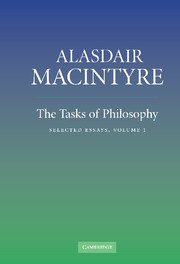Book contents
- Frontmatter
- Contents
- Preface
- Acknowledgments
- PART I DEFINING A PHILOSOPHICAL STANCE
- PART II THE ENDS OF PHILOSOPHICAL ENQUIRY
- 7 The ends of life, the ends of philosophical writing
- 8 First principles, final ends, and contemporary philosophical issues
- 9 Philosophy recalled to its tasks: a Thomistic reading of Fides et Ratio
- 10 Truth as a good: a reflection on Fides et Ratio
- Index
8 - First principles, final ends, and contemporary philosophical issues
Published online by Cambridge University Press: 05 June 2012
- Frontmatter
- Contents
- Preface
- Acknowledgments
- PART I DEFINING A PHILOSOPHICAL STANCE
- PART II THE ENDS OF PHILOSOPHICAL ENQUIRY
- 7 The ends of life, the ends of philosophical writing
- 8 First principles, final ends, and contemporary philosophical issues
- 9 Philosophy recalled to its tasks: a Thomistic reading of Fides et Ratio
- 10 Truth as a good: a reflection on Fides et Ratio
- Index
Summary
Nothing is more generally unacceptable in recent philosophy than any conception of a first principle. Standpoints mutually at odds with each other in so many other ways, of analytic or continental or pragmatic provenance, agree in this rejection. And yet the concept of a first principle seems to have been for Aquinas, just as it had been for Aristotle, and before him for Plato, in itself unproblematic. For both Aquinas and Aristotle, of course, difficult questions do arise about such issues as the relationship of subordinate principles to first principles, the nature of our knowledge of first principles and the differences between the first principles of the different sciences. But in their writings debate even about such complex issues seems always to presuppose as not to be put in question, as never yet having been seriously put in question, the very idea of a first principle.
It is then unsurprisingly in the context of philosophical preoccupations and through the medium of philosophical idioms quite alien to those of either Aristotle or Aquinas that the very idea of a first principle has now been radically put in question, preoccupations which it is, therefore, difficult to address directly from a Thomistic standpoint with only the resources afforded by Aquinas and his predecessors. Hence it seems that, if this central Aristotelian and Thomistic concept is to be effectively defended, in key part it will have to be by drawing upon philosophical resources which are themselves – at least at first sight – as alien to, or almost as alien to, Thomism as are the theses and arguments which have been deployed against it.
- Type
- Chapter
- Information
- The Tasks of PhilosophySelected Essays, pp. 143 - 178Publisher: Cambridge University PressPrint publication year: 2006
- 2
- Cited by

